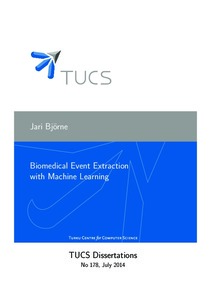Biomedical Event Extraction with Machine Learning
Björne Jari
https://urn.fi/URN:NBN:fi-fe2021042714505
Tiivistelmä
Biomedical natural language processing (BioNLP) is a subfield of natural
language processing, an area of computational linguistics concerned
with developing programs that work with natural language: written texts and
speech. Biomedical relation extraction concerns the detection of
semantic relations such as protein--protein interactions (PPI) from scientific
texts. The aim is to enhance information retrieval by detecting relations
between concepts, not just individual concepts as with a keyword search.
In recent years, events have been proposed as a more detailed alternative for
simple pairwise PPI relations. Events provide a systematic, structural
representation for annotating the content of natural language texts. Events are
characterized by annotated trigger words, directed and typed arguments and the
ability to nest other events. For example, the sentence ``Protein A causes
protein B to bind protein C'' can be annotated with the nested event structure
CAUSE(A, BIND(B, C)). Converted to such formal representations, the
information of natural language texts can be used by computational
applications. Biomedical event annotations were introduced by the BioInfer and
GENIA corpora, and event extraction was popularized by the BioNLP'09 Shared Task
on Event Extraction.
In this thesis we present a method for automated event extraction, implemented
as the Turku Event Extraction System (TEES). A unified graph format is defined
for representing event annotations and the problem of extracting complex event
structures is decomposed into a number of independent classification tasks.
These classification tasks are solved using SVM and RLS classifiers, utilizing
rich feature representations built from full dependency parsing. Building on
earlier work on pairwise relation extraction and using a generalized graph
representation, the resulting TEES system is capable of detecting binary
relations as well as complex event structures.
We show that this event extraction system has good performance,
reaching the first place in the BioNLP'09 Shared Task on Event Extraction. Subsequently,
TEES has achieved several first ranks in the BioNLP'11 and BioNLP'13 Shared
Tasks, as well as shown competitive performance in the binary relation Drug-Drug
Interaction Extraction 2011 and 2013 shared tasks.
The Turku Event Extraction System is published as a freely available open-source
project, documenting the research in detail as well as making the method
available for practical applications. In particular, in this thesis we
describe the application of the event extraction method to PubMed-scale text
mining, showing how the developed approach not only shows good performance, but
is generalizable and applicable to large-scale real-world text mining projects.
Finally, we discuss related literature, summarize the contributions of the work
and present some thoughts on future directions for biomedical event extraction.
This thesis includes and builds on six original research publications. The first
of these introduces the analysis of dependency parses that leads to
development of TEES. The entries in the three BioNLP Shared Tasks, as well as
in the DDIExtraction 2011 task are covered in four publications, and the sixth
one demonstrates the application of the system to PubMed-scale text mining.
Kokoelmat
- Rinnakkaistallenteet [19207]
